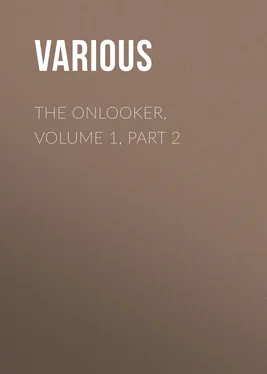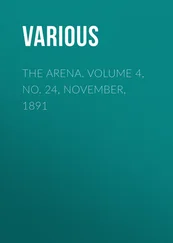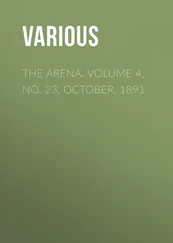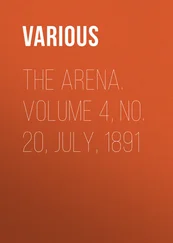Various - The Onlooker, Volume 1, Part 2
Здесь есть возможность читать онлайн «Various - The Onlooker, Volume 1, Part 2» — ознакомительный отрывок электронной книги совершенно бесплатно, а после прочтения отрывка купить полную версию. В некоторых случаях можно слушать аудио, скачать через торрент в формате fb2 и присутствует краткое содержание. Жанр: foreign_antique, periodic, foreign_edu, на английском языке. Описание произведения, (предисловие) а так же отзывы посетителей доступны на портале библиотеки ЛибКат.
- Название:The Onlooker, Volume 1, Part 2
- Автор:
- Жанр:
- Год:неизвестен
- ISBN:нет данных
- Рейтинг книги:5 / 5. Голосов: 1
-
Избранное:Добавить в избранное
- Отзывы:
-
Ваша оценка:
- 100
- 1
- 2
- 3
- 4
- 5
The Onlooker, Volume 1, Part 2: краткое содержание, описание и аннотация
Предлагаем к чтению аннотацию, описание, краткое содержание или предисловие (зависит от того, что написал сам автор книги «The Onlooker, Volume 1, Part 2»). Если вы не нашли необходимую информацию о книге — напишите в комментариях, мы постараемся отыскать её.
The Onlooker, Volume 1, Part 2 — читать онлайн ознакомительный отрывок
Ниже представлен текст книги, разбитый по страницам. Система сохранения места последней прочитанной страницы, позволяет с удобством читать онлайн бесплатно книгу «The Onlooker, Volume 1, Part 2», без необходимости каждый раз заново искать на чём Вы остановились. Поставьте закладку, и сможете в любой момент перейти на страницу, на которой закончили чтение.
Интервал:
Закладка:
Various
The Onlooker, Volume 1, Part 2
The Casual Club
On last Thursday evening the Casual Club was gathered about a corner table in Sherry's. The great room was beautiful, the music brilliant, the setting and table appointments magnificent, and the dinner all that might be asked. There came but one thing to grieve the tempers of our members—the service was slip-shod, inattentive, vile. One wonders that so splendid an arrangement should be left unguarded in the most important particular of service; that Sherry, when he has done so much, should permit himself to be foiled of a last result by an idle carelessness of waiters, who if they do not forget one's orders outright, execute them with all imaginable sloth. They attend on guests as though the latter were pensioners, and are listless in everything save a collection of the gratuity, personal to themselves, which their avarice and a public's weakness have educated them to expect.
Clams had occurred, and while we were discussing these small sea-monsters, Fatfloat broke suddenly forth. "I don't know if it be a subject for self-gratulation or no, but I observed that the daily papers took quick note of my statement that Tammany Hall was looted of its last shilling. For the guidance of these energetic folk of ink and types, I will unfold a further huddle of details. Instead of nine hundred thousand dollars, there were more than one million collected for the Tammany campaign. No one can show where so much as two hundred thousand dollars were honestly disbursed. Let me tell a story; it may suggest an idea to our diligent friends of the Dailies. There is a rotund, porpoise-shaped globular gentleman known of these parts as 'Bim the Button Man.' This personage went into the printing business at the beginning of the late campaign and went out of it—like blowing out a candle—at the close. Bim the Button Man, for his brief parade as a printer, took a partner. Or perhaps the partner took Mr. Bim. The partner was and is a doughty 'leader.' It was the new-made firm of 'Bim' that flourished in the production of those posters and lithographs of Mr. Shepard which for so long disfigured the town. Mr. Mitchell, printer, complained bitterly over this invasion of his rights by Mr. Bim. The latter snapped pudgy fingers at the querulous Mr. Mitchell by virtue of his powerful partner. Who was Mr. Bim's partner? One year before when Mr. Mitchell's bill was seven thousand dollars, Mr. Croker, being in a frugal mood, felt excessively pained. Why then should it mount last autumn to three hundred thousand dollars and excite neither grief nor reproach? And what was got for those three hundred thousand dollars? When a show leaves New York, it carries posters wherewith to embellish each fence and bill board in the land; and yet no show ever paid more than ten thousand dollars for paper. Five thousand dollars will cover every possible coign of bill-sticking advantage and hang, besides, a lithograph of Mr. Shepard in every window in the city of New York. Then wherefore those three hundred thousand dollars of Tammany? There be folk on the finance committee who should go into this business with a lantern. The most hopeful name of these is Mr. McDonald, our great subway contractor and partner of Mr. August Belmont; he is a member of that committee. He is, too, a gentleman of intelligence, business habits and high worth. Mr. McDonald of the subway, for his own credit and that of Mr. Belmont, his partner, should never sleep until he turned out the bottom facts of that Tammany treasure which has disappeared. Nor should a common interest with Mr. Croker and certain of that gentleman's retainers in the Port Chester railway deter him. Is there no honest man in Athens?"
It was at the close of the repast and when cigars were smokily going that Vacuum returned to the subject of Tammany Hall.
"Let me congratulate you, my dear Enfield," observed Vacuum courteously, "on your genius for prophecy. At our last meeting, you foretold the near overthrow of Mr. Nixon and the Croker regime. The papers inform me that all came to pass within the two days following your warning."
"Yes," said Lemon sarcastically, taking the words from Enfield, "we have been visited with that fell calamity, the collapse of Mr. Croker and his rule. We have seen the black last of him, and the very name of Croker already begins to be a memory. But why should one repine?" Lemon's sneer was deepening. "In every age the other great have come and ruled and gone to that oblivion beyond. They arose to fall and be forgot. It is the law. Then why not Mr. Croker? True, even while we consent, there comes that natural sadness which I now observe to sparkle so brightly in every present eye. What then? We console ourselves as did Chief Justice Crewe full two centuries and a half ago when the decadence of De Vere claimed consideration. 'I have labored,' quoth Crewe, who if that be possible was more moved over the waning of De Vere than am I concerning the passing of Mr. Croker, 'I have labored to make a covenant with myself that affection may not press upon judgment; for I suppose there is no man that hath any apprehension of gentry or nobleness but his affection stands to the continuance of a house so illustrious and would take hold on a twig or a twinethread to support it. And yet Time hath his revolutions; there must be a period and an end to all temporal things—finis rerum—an end of names and dignities and whatsoever is terrene; and why not of De Vere? For where is Bohun? where is Mowbray? where is Mortimer? nay, which is more and most of all, where is Plantagenet? They are entombed in the urns and sepulchres of mortality!' And, as it was of that ancient day of Crewe and the De Vere so must it be of us and Mr. Croker. He goes; we stay; and so let us drink to all." Here Lemon filled his glass, and the rest having amiably followed his example, offered with a wicked twinkle, "The disappearance of Mr. Croker!"
"What I regret in the business," remarked Fatfloat as he put down his glass, "is the ill fortune of Mr. Nixon. There is much of good honesty about that gentleman; he is high-minded and proud; I cannot but sympathize with him in his present plight."
"And yet," observed Enfield, mildly, "Mr. Nixon should have avoided that trap of an empty leadership. Mr. Nixon is no stripling; he knew Tammany and those elements of mendacity and muddy intrigue which are called its 'control'; he knew Mr. Croker, who in these last days was faithful to no promise and loyal to no man. Why did he permit himself to be flattered, cozened and destroyed? Why? He added inexperience to vanity and betrayed himself. It was the old story—the conference of that leadership on Mr. Nixon—the old story of the Wolf and Little Red Riding Hood, with Mr. Croker as Wolf and Mr. Nixon the innocent who was eaten up. No, no; he might have better guided himself. Mr. Nixon—were all about the friendliest—was still unfit for the place. It was like putting a horse in a tree-top; it gave the horse no grace nor glory and offered a sole assurance of his finally falling out."
"Isn't Mr. Nixon himself an honest man?" asked Van Addle.
"Were it to be merely a question of honesty," replied Enfield, "Mr. Nixon would make perfect answer. Broadly, he is an honest man. But that, politically, is all. And there be enterprises, such as Tammany Hall and the Stock Market, wherein to be merely honest is not a complete equipment. Moreover, in this business of his so-called 'leadership,' Mr. Nixon might have carried himself with a more sensitive integrity and been bettered vastly thereby. You will recall that when Mr. Nixon performed as chairman of the Tammany anti-vice committee, he discovered in its entire membership that combine of blackmail and extortion which, standing at the head of Tammany and doing its foul work through the police, fostered crime in the community for a round return of four millions a year. Mr. Nixon called these evil folk by name and pointed to them. He could still relate that roll and never miss an individual. And if he did not put actual hand on the sly presiding genius, I warrant you he might, were he so inclined, indite a letter to him and get the address right."
Читать дальшеИнтервал:
Закладка:
Похожие книги на «The Onlooker, Volume 1, Part 2»
Представляем Вашему вниманию похожие книги на «The Onlooker, Volume 1, Part 2» списком для выбора. Мы отобрали схожую по названию и смыслу литературу в надежде предоставить читателям больше вариантов отыскать новые, интересные, ещё непрочитанные произведения.
Обсуждение, отзывы о книге «The Onlooker, Volume 1, Part 2» и просто собственные мнения читателей. Оставьте ваши комментарии, напишите, что Вы думаете о произведении, его смысле или главных героях. Укажите что конкретно понравилось, а что нет, и почему Вы так считаете.












